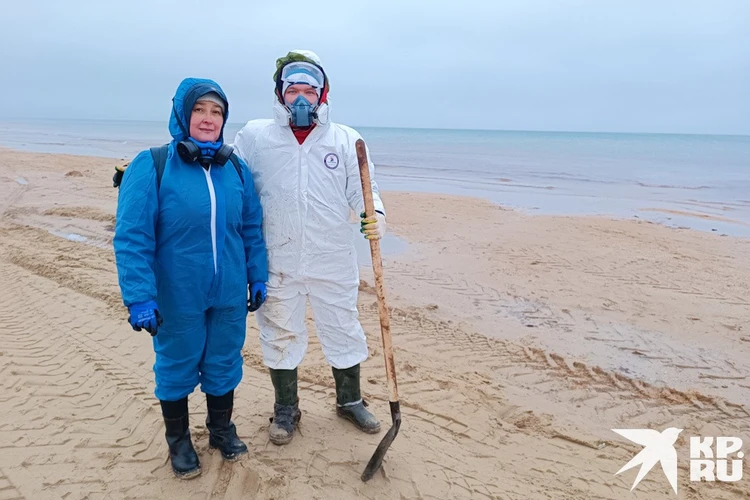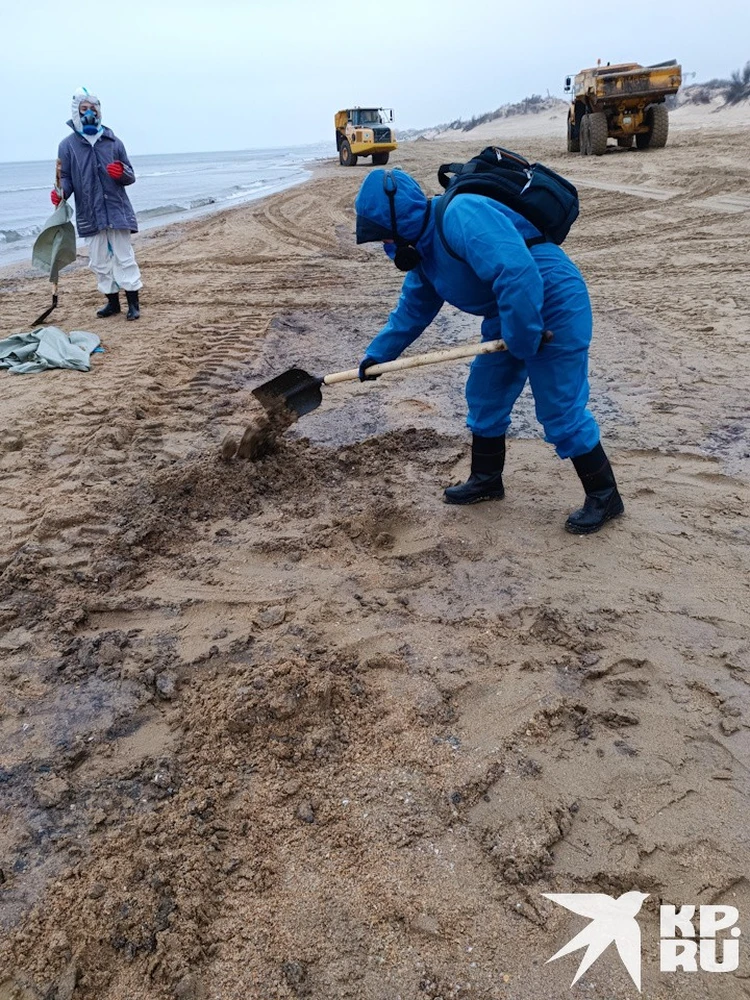"How volunteers are saving the Black Sea from oil pollution: 'Time is measured by cleaned birds; nothing is more important right now.' Photo and video."
 1
1The New Year in Anapa was tinged with sadness.
Photo: Natalia VARSEGOVA. Go to the Photo Bank KP
The tankers "Volganefth 212" and "Volganefth 239" sank in the Kerch Strait on December 15 during a severe storm. One person died, while others were rescued. A powerful wave broke the tankers' long platforms in half, damaging some of the fuel tanks. According to the Ministry of Transport, 2400 tons spilled into the sea. On December 17, part of the pollution washed ashore near Anapa, Temryuk, and Kerch.
 2
2This is what Anapa's beaches looked like on December 17. Photo: Evgeny GRIGORENKO
The contaminated area stretched along the coast for 54 km. Later, Rostransnadzor announced that vessels should not have been in the strait during bad weather due to seasonal restrictions. Why they were there will be left for the investigation to determine. My report is about the people. About how this ecological disaster divided our society into "us" and "them."
THREE HOURS AND THAT'S IT
- When you get home, take eight tablets of activated charcoal right away, - advises me volunteer, sambо and judo coach, 46-year-old Evgeny Grigorenko. Together we head to collect fuel oil near the Anapa sanatorium "Dynamo." Zhenya comes here every day from a neighboring stanitsa. - Charcoal is good for removing this stuff from your system.
 3
3A reminder for volunteers.
Photo: Natalia VARSEGOVA. Go to the Photo Bank KP
I arrived in Anapa early in the morning and was at the volunteer headquarters by noon. There, I registered (that's the procedure), received chemical protection gear, a respirator, gloves, and rubber boots. I was strictly instructed to work no more than three hours to avoid poisoning from toxic fumes and to never remove the respirator.
 4
4After three hours of intensive work: journalist “KP” Natalia Varsegova and sambо and judo coach Evgeny Grigorenko.
Photo: Natalia VARSEGOVA. Go to the Photo Bank KP
I struggle to walk in the clumsy rubber boots along the sandy beach, following my mentor. There isn’t much fuel oil on the shore, and volunteers are actively cleaning the area. Everywhere there are bags, piles of blackened sand, and tractors with KamAZ trucks.
- Stop! – commands Zhenya. – Do you see the purple spill? That’s fuel oil mixed with seawater.
Indeed, on the sand, there’s a huge pale purple stain. The coach carefully scrapes it with a shovel, and my job is to hand him bags.
 5
5Our special correspondent cleaned the beaches of fuel oil alongside volunteers.
Photo: Natalia VARSEGOVA. Go to the Photo Bank KP
- Keep it lower, - Evgeny requests. – But if your back starts to hurt, let me know immediately.
After a few shovel throws, the bag is two-thirds full. I can’t move it; the wet sand is heavy. My partner lifts it with both hands and drags it away. Nearby, there’s a small black stain. We scoop it with the shovel, but it expands, and the deeper we go, the wider it gets.
- The fuel oil settled in layers during the storm, so there’s a lot underneath the sand, - Zhenya puffs under his tight respirator. Mine keeps slipping off, especially when I hold the bag with my head down. I try to adjust it, but then realize – I can’t touch the respirator with dirty gloves.
 6
6Fuel oil lays in layers; there's still a lot underneath the sand.
Photo: Natalia VARSEGOVA. Go to the Photo Bank KP
Meanwhile, the stain continues to widen beneath the layer of sand; a puddle fills up, spreading rainbow streaks. The acrid smell makes my eyes and nose run. I remove the respirator to catch my breath. I can’t reach for tissues; they’re in my pockets under the chemical protection gear, so I rinse my face in the sea.
- What are you doing?! – I hear a sharp male shout. A stern man in camouflage (probably a rescuer) drives me away from the water. – You can’t do that if you don’t want to get poisoned!
The coach shakes his head – oh you...
 7
7The central beach was trenched to prevent new oil spills from spreading across the area.
Photo: Natalia VARSEGOVA. Go to the Photo Bank KP
NO HIDING TEARS
- As soon as the news about the sunken vessels came out, I understood everything immediately, - Evgeny tells me during the cleanup of the fuel oil. – My friends and I do kitesurfing (riding a board on water or sand using a kite - Ed.), we always track the wind direction. And on those days, the storm was pushing waves toward Anapa. So we expected the oil spill any day. It happened on the night of December 17. In the morning, my friend and I drove along the beaches in an SUV and cried. Huge stinky black spots covered the entire shore. In some places, even the sand was not visible. And in these spots, birds covered in fuel oil were flapping around. We immediately sent out a call in local Telegram groups: “Everyone who can, come to the shore. This is our common misfortune, our sea, our land.”
 8
8Even graffiti in Anapa reflects the current mood.
Photo: Natalia VARSEGOVA. Go to the Photo Bank KP
Thanks to people like Evgeny, many local residents came out to the beaches the next day, including the young and the old. Shovels and bags – that’s all the simple technology for collecting oil. At first, there were no respirators or chemical protection. Nobody knew that fuel oil was highly toxic. In the first few days, people complained of stomach pains, dizziness, and eye irritation. They worked day and night, collecting oil in bags. But the storm intensified, causing even more pollution. Moreover, the toxic substance was eating through the bags and spilling onto the sand. And as they say – back to square one.
 9
9Bags of fuel oil are stacked on the shore and then taken away.
Photo: Natalia VARSEGOVA. Go to the Photo Bank KP
- There was a lack of equipment, just one tractor within a three-kilometer radius, and that was it, - Evgeny recalls. – Now, when they finally declared a state of emergency nationwide, loaders, trucks, and excavators have appeared.
ACT OF KINDNESS
Our work is going well. Zhenya digs, and I hold the bags. Nearby, there are other volunteers. A 19-year-old girl came from Krasnodar and took on the hardest task – cleaning small oil spots washed in by the waves. Ten meters away, a man and a woman are working, and behind them, some young people are bustling about. I tried to dig in the wet sand – my lower back screamed.
 0
0